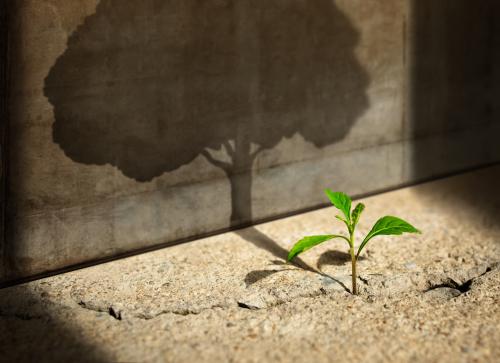Thank you for the opportunity to participate in this distinguished panel to launch this important new book Humanitarian Diplomacy. I found the book to be a fascinating collection of diverse experiences which practitioners have talked about in an anecdotal fashion for many years. The concept of humanitarian diplomacy is a useful framework for analyzing diverse actions by different actors with different short-term objectives in virtually all regions of the world. And for people working in the humanitarian community, the book is a testament to the creativity and commitment of many people working in dangerous situations to get humanitarian relief to people in need.
I would like to begin with one general comment and then focus on several issues related to NGOs and humanitarian diplomacy.
The general comment is a sense of sadness at the fragility of the humanitarian enterprise. As many have discussed and the studies in this volume illustrate, the very concept of humanitarianism is under siege. The perception that humanitarianism is a Western liberal invention rather than a universal norm erodes the protection formerly enjoyed by humanitarian actors. The study on Afghanistan even charts the moment when the change came: “The Taliban’s predecessors had accepted humanitarian actors as relatively neutral and impartial players…For the Taliban, however, the targeting of civilians and the denial of access and humanitarian assistance became integral parts of their war strategy.” (p. 156) So too, other governments and warring parties have adopted similar policies; displacement of populations and denial of assistance has been a military strategy in situations as diverse as Bosnia and the Democratic Republic of the Congo. The extent to which humanitarian action is possible usually depends on the belligerents – how much they know about international humanitarian law or how much they perceive that respecting it will further their own interests.
The vagaries of conflict mean that the ability to provide assistance to large numbers of internally displaced persons and other civilians at risk often depends on the whims of a soldier at a checkpoint or a bandit hoping to make a buck. While humanitarian access can depend on the skill of the negotiators – as illustrated in this book — it is more often determined by the belligerent forces. The truth is that humanitarians don’t have much leverage when negotiating with people with the guns. In the past, such protection was the result of a perception that it was in everyone’s interest to respect humanitarian neutrality, but that perception is clearly breaking down. Given current trends with resource wars and fragmentation of rebel movements, respect for international humanitarian law is not likely to improve.
The actions of humanitarian actors themselves can also impact on security and access – particularly their relations with governments. And in this respect, perceptions can be more important than the actual relationships. The study on Iraq, for example, illustrates the difficulties when the public perceives that humanitarian work is being conducted in support of political and military objectives – even when the relief agencies tried to distance themselves from the military efforts.
There are some who argue that we need to be uncompromising in our neutrality and impartiality as the only way of recovering humanitarian principles while others advocate a more pragmatic course. I don’t know what the answer is – to go back to basics in reaffirming classic humanitarian principles or to ‘get innovative about how we do things’ as Claudia Rodriguez frames the debate in her study. But the erosion of humanitarian principles and practice is certainly occurring and I fear that we are incrementally losing something very precious – humanitarian ideals. I also wonder about the extent to which humanitarian diplomacy itself may be contributing to this erosion. In particular, the study on the Balkans raises the question of whether the negotiations which took place – which had to take place to secure access to those in need – may have contributed to the weakening of humanitarian principles. Similarly, the study on Afghanistan refers to “unsavoury deals” while the chapter on Somalia raises the question of whether negotiating with warlords has the effect of legitimizing them. Humanitarian diplomacy is often based on compromise and yet compromising on basic humanitarian principles can weaken them.
Turning now to NGOs, there has been growing awareness over the last decade of the role NGOs play in protection of refugees, internally displaced persons and other civilians. The studies in this volume illustrate that international NGOs can and do use humanitarian diplomacy to protect and assist vulnerable people. But I was struck by the lack of reference to national NGOs in this volume. With the exception of the study on Lebanon, national NGOs are hardly mentioned. I have argued recently that, in spite of the rhetoric of solidarity, international NGOs have more in common with UN agencies than with national or Southern NGOs. This volume reinforces that argument, but I wonder about the extent to which these techniques also apply to national NGOs’ involvement with humanitarian diplomacy. National NGOs face different pressures and have different assets than national staff of international NGOs.
A second issue related to NGOs is coordination – a term which often seems to be an oxymoron. Almost all of the studies highlight the difficulties for humanitarian diplomacy when humanitarian actors pursue divergent approaches. NGOs in particular often do not feel bound by UN-negotiated agreements. For example, the study on Sudan illustrates that while Operation Lifeline Sudan was carefully negotiated with the Sudanese government and rebel forces, NGOs carried out their own airlifts which sometimes complicated the UN’s efforts. The actions taken by one humanitarian actor can have consequences for others. I was also struck by the fact that even though there are different actors with different constituencies and mandates, in most situations the public perception is that humanitarian actors are all lumped in together. As the study on ICRC’s role in East Timor noted, the arrival of hundreds of new NGOs complicated the humanitarian landscape. Today there are opportunities for humanitarian actors –Red Cross/Crescent societies, NGOs and UN agencies – to work more intentionally together through the recently-established Global Humanitarian Platform. This is in everyone’s interest. To the extent that the humanitarian community can adopt similar or complementary strategies – whether in Cambodia or East Timor or Colombia – the possibilities for effective humanitarian action are increased.
Finally, although I’m a big supporter of NGOs, I thought the book was quite gentle on the issues of NGO accountability and competition between NGOs. International NGOs – even very powerful NGOs – do not have the same accountabilities as governments or multilateral actors which makes coordination difficult. NGOs can often say ‘we can’t coordinate our work with you because we are accountable to our board of directors which has set different priorities.’
Competition between NGOs is, I believe, the biggest impediment to coordination. International NGOs compete with each other and with UN agencies for donor funding; they also compete with national NGOs. This point is nuanced several times in the book, but I think it deserves more attention. Like many of you, I have seen many occasions where NGOs jockey for international press coverage because of the comparative advantage it gives them in fund-raising with the public. And sadly, I have seen cases of NGOs withholding information from one another because information is, after all, power.
I am grateful to the editors for putting together this collection of studies on humanitarian diplomacy. They raise more questions than they answer – which is, of course, the mark of a good book.
Edited by Larry Minear & Hazel Smith, United Nations University
The Brookings Institution is committed to quality, independence, and impact.
We are supported by a diverse array of funders. In line with our values and policies, each Brookings publication represents the sole views of its author(s).



Commentary
Maintaining Humanitarian Ideals in Conflict Situations
September 14, 2007